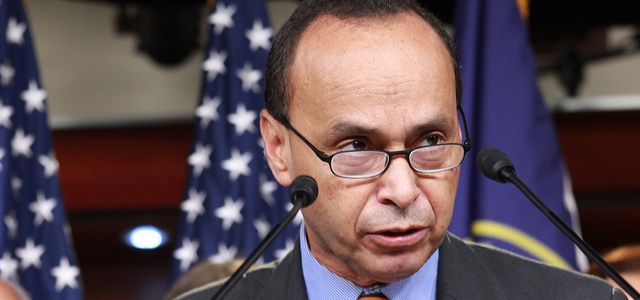 The “Gang of Eight” officially introduced their comprehensive immigration reform bill—the Border Security, Economic Opportunity and Immigration Modernization Act—in the Senate today, capping off months of negotiations to craft a bipartisan solution. As many have said, it is not a perfect bill, but it is a good compromise that will go far in an attempt to fix our broken immigration system.
The “Gang of Eight” officially introduced their comprehensive immigration reform bill—the Border Security, Economic Opportunity and Immigration Modernization Act—in the Senate today, capping off months of negotiations to craft a bipartisan solution. As many have said, it is not a perfect bill, but it is a good compromise that will go far in an attempt to fix our broken immigration system.
Members of a House group who have been working on a House immigration measure, including Reps. Luis Gutierrez (D-IL) and Raul Labrador (R-ID), released the group’s first public statement to show support for the Senate bill and promised their own legislation soon. “We believe we will soon agree on a reasonable, common-sense plan to finally secure our borders and strengthen our economy, with a tough but fair process that respects the rule of law so immigrants can contribute to our country,” the statement said. And President Obama praised the bill yesterday after meeting with Sens. John McCain (R-AZ) and Chuck Schumer (D-NY). And while he said in a statement that no one gets everything they want from the bill, including him, “it is largely consistent with the principles that I have repeatedly laid out for comprehensive reform.”
The Senate bill certainly goes far. It includes a path to citizenship, creates a new W visa for hiring foreign workers while increasing the number of H-1B visas, and expands uncapped visas available to spouses and children of both permanent legal residents and persons receiving employment-based lawful permanent resident status. The Department of Homeland Security will receive about $5 billion to fund border security enhancements. And for interior enforcement, the bill requires U.S. employers to implement E-Verify, and government officials will have to set up an exit/entry system to track if foreign visitors or workers overstay their visas.
But the legislation also gets rid of the diversity visa and eliminates the sibling category for family visas, which some organizations have argued today would hurt the family-based immigration system. Additionally, it lacks protections for bi-national LGBT couples, although advocates are hopeful the Uniting American Families Act—which would allow LGBT Americans to sponsor foreign partners for U.S. residency—will be added to the immigration bill during the amendment process. “They expect an amendment to be offered and they expect all their Democratic colleagues to vote in favor of that amendment,” Steve Ralls, Immigration Equality spokesman, told the Washington Blade.
Under the bill, immigrants who are undocumented and apply for legal status would have a roughly 13-year wait for citizenship, but they would not qualify for some public benefits, including health care. “As currently proposed, immigrant women and families would have to wait at least 13 to 15 years for access to affordable health insurance options,” said Jessica González-Rojas, executive director of the National Latina Institute for Reproductive Health.
The concerns about the bill are valid, and it still has a long process through committee hearings and the mark-up in the Senate. But it is a starting point. Hopefully, at the end of the long process, the bill will retain much of its same shape as an important fix to U.S. immigration laws.
Photo by Talk News Radio Service.
FILED UNDER: Border, Gang of Eight, Hearings, immigration legislation, immigration reform, President Obama, Republicans, undocumented immigration


